Director – Kogonada – 2022 – US – Cert. PG – 96m
****1/2
In the distant future, a couple must come to terms with the loss of the eldest child, actually an A.I. purchased as an ethnically programmed companion for their adopted South East Asian daughter – SF mystery drama is on Sky Cinema from Thursday, September 22nd
Memory is one of the great themes of cinema because when you point a moving image camera at someone, you capture and preserve their moving image for posterity. (Something similar happens when you record the sound of someone’s voice. Or even if you write down their words on paper, a simpler, more primitive form of recording.) Memory is also one of the elements which defines us as human beings.
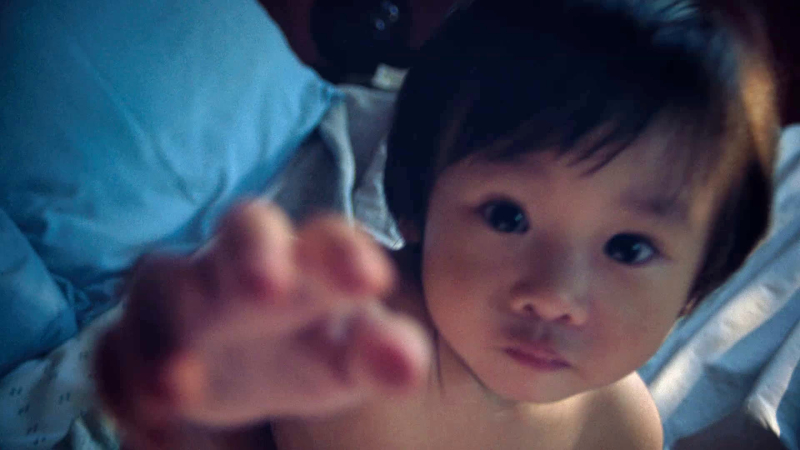
Full marks, then, to director (actually writer, director, editor) Kogonada for taking the short story Saying Goodbye To Yang by Alexander Weinstein and expanding it into a feature. As described in the parlance of the distant future world in which this is set, Yang is a technosapien (i.e. a robot), a purchased elder sibling of a family comprising father Jake (Colin Farrell), mother Kyra (Jodie Turner-Smith) and daughter Mika (Malea Emma Tjandrawidjaja).
Mika is adopted, and her ever so Hollywood liberal parents – he a white man who has built a business around his passion for tea, she a black woman who is a hard-working, highly motivated high-flier in a demanding corporate business that’s never really defined – are concerned that she connect with her South East Asian heritage. So, with their limited family budget at their disposal, they’ve purchased Yang from a company that refurbishes technosapiens which have been returned by previous owners so that he can fulfil this connection function as Mika’s older brother. All has gone according to plan until one day Yang suddenly shuts down and won’t reboot, which is pretty much the point at which the narrative here starts.
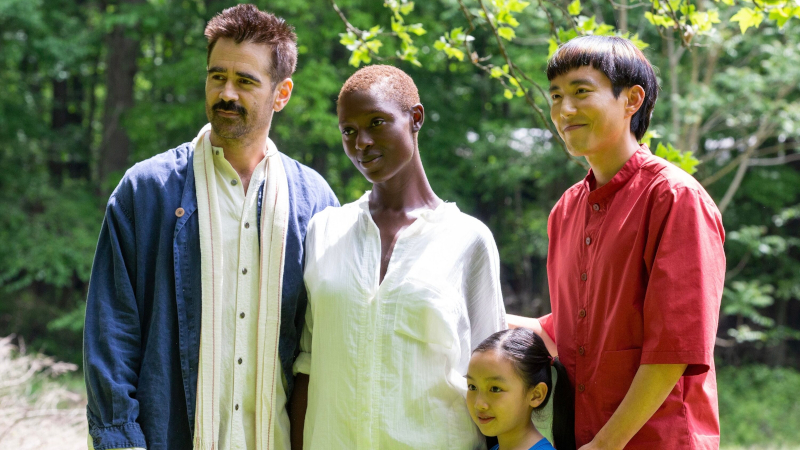
The opening has Yang (Justin H. Min) setting up a camera to take a family portrait including himself, which dives straight in to the area of memory and capturing images. And because this is the scene at the start of a movie, a representation rather than something that actually happened to you or I in real life, it lends the piece immediate cinematic currency. Kyra’s full on work schedule means that it’s up to Jake to get Yang fixed. Next door neighbour George (Clifton Collins Jr.) tells him not to bother with the company from whom he bought the refurbished Yang, as they have all sorts of laws (actually, company-originated policy) that makes it likely they won’t actually do anything practical to help resolve the issue and get Yang back up and running.
When this indeed proves to be the case, because the company isn’t “legally” allowed to tamper with Yang’s core where the issue has occurred – and by the way charges a hefty sum for the privilege of finding this out – Jake is forced to follow George’s other suggested path: he knows a technician called Russ (Ritchie Coster) who will probably be able to help. In his workshop where Yang lies on a workbench, Russ tells Jake that the company plants spyware in their robots, so has various policies to prevent them being accessed outside the company itself.

Later, he sends Jake to a contact who works in a museum who should be able to build him a reader to access whatever is in Yang’s core and view it for himself. The contact is no longer there, fuelling Russ’ personal conspiracy theories, and Jake finds himself instead dealing with Cleo (Sarita Choudhury), an academic at the museum to whose on-site lab he has Yang transported and who builds him a reader. She tells him he’ll find not spyware but little files representing recorded fragments of Yang’s audiovisual memory.
Now Jake can start exploring these on his home computer – they appear in the movie like brief, hi-resolution GIFs – and many of them feature a girl Ad or Adie or something similar Yang knew. Jake’s attempts to track her down initially prove unsuccessful, but then Ada (Haley Lu Richardson, from Support The Girls, Andrew Bujalski, 2018) turns up at his front door…
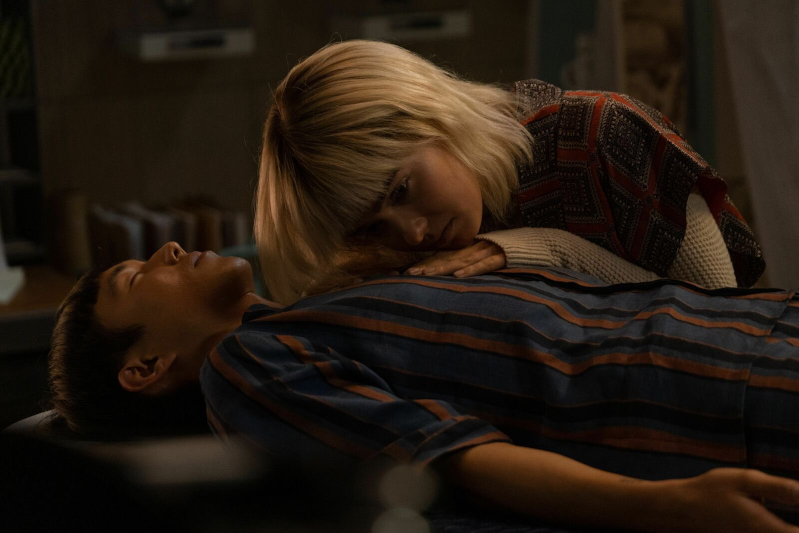
If this doesn’t quite seem to know how to end (although it certainly doesn’t outstay its welcome and 96 minutes is a respectable running length which certainly no-one can accuse of being over-long or indulgent), it seems more successful as a journey than a destination, and a fascinating journey it proves to be.
The future setting is something of a conundrum: the houses contain large and spacious rooms and seem to be surrounded by vast areas of green space, but it’s unclear (a) how far that’s a function of the couple’s upward mobility and (b) if that really is vegetation or actually some giant illusion e.g. on a curved screen or dome interior. Apart from the opening family photograph, presumably set up and taken in a large garden or public park near the house, everything seems to happen indoors – the family and neighbours’ homes, a fish shop (on the site of the retail outlet where Jake originally bought the robot), the company premises where he tries to have the robot repaired, Russ’ cramped, windowless workshop, various rooms and exhibition spaces at the museum and the many self-driving, electric car journeys (including Mika’s school run) that punctuate the proceedings, with vegetation inside the sealed car and barely visible tunnel housings outside. Everything would appear to have been built following some sort of ecological catastrophe.
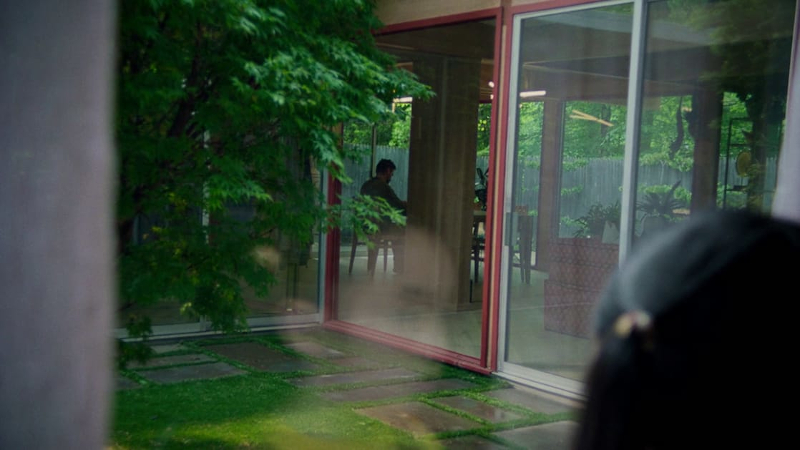
The script is far more invested in the journey into the deactivated Yang’s mind, with plenty of flashbacks and memories from his past(s) and the introduction of further characters from there as the film moves on. It’s a peculiar effect, at once dispassionately clicking with Jake on computer files and looking at moments or lesser or greater significance in a (to all intents and purposes) deceased character’s past life or lives to considerable emotional impact. In passing, this covers such issues as family, loss, bereavement, memory and purpose. Just as the opening scene concerns a family portrait, so the narrative itself is a portrait of this particular family. While it never comes to any specific conclusions, it certainly poses some very interesting questions. Well worth watching: be prepared for some challenging conversations in its wake.
After Yang is on Sky Cinema from Thursday, September 22nd.
Trailer:
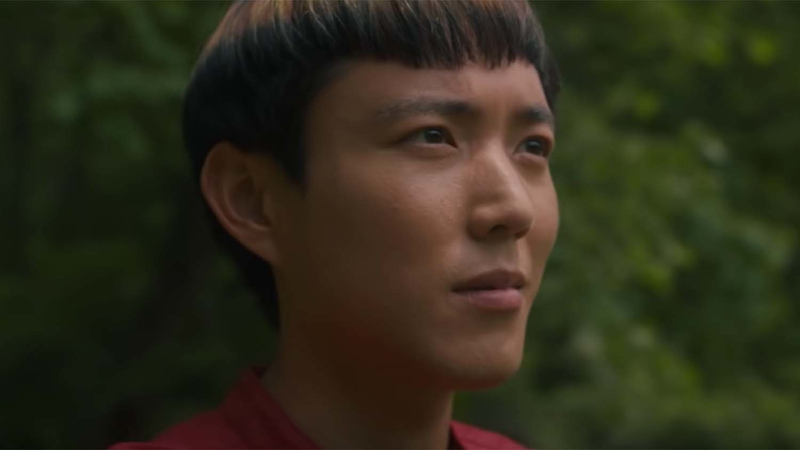
One reply on “After Yang”
Kogonada brings a poetic sensibility to an understated approach, but I find the pulse of the film too muffled to inspire, despite posing, as you said, some very interesting questions.